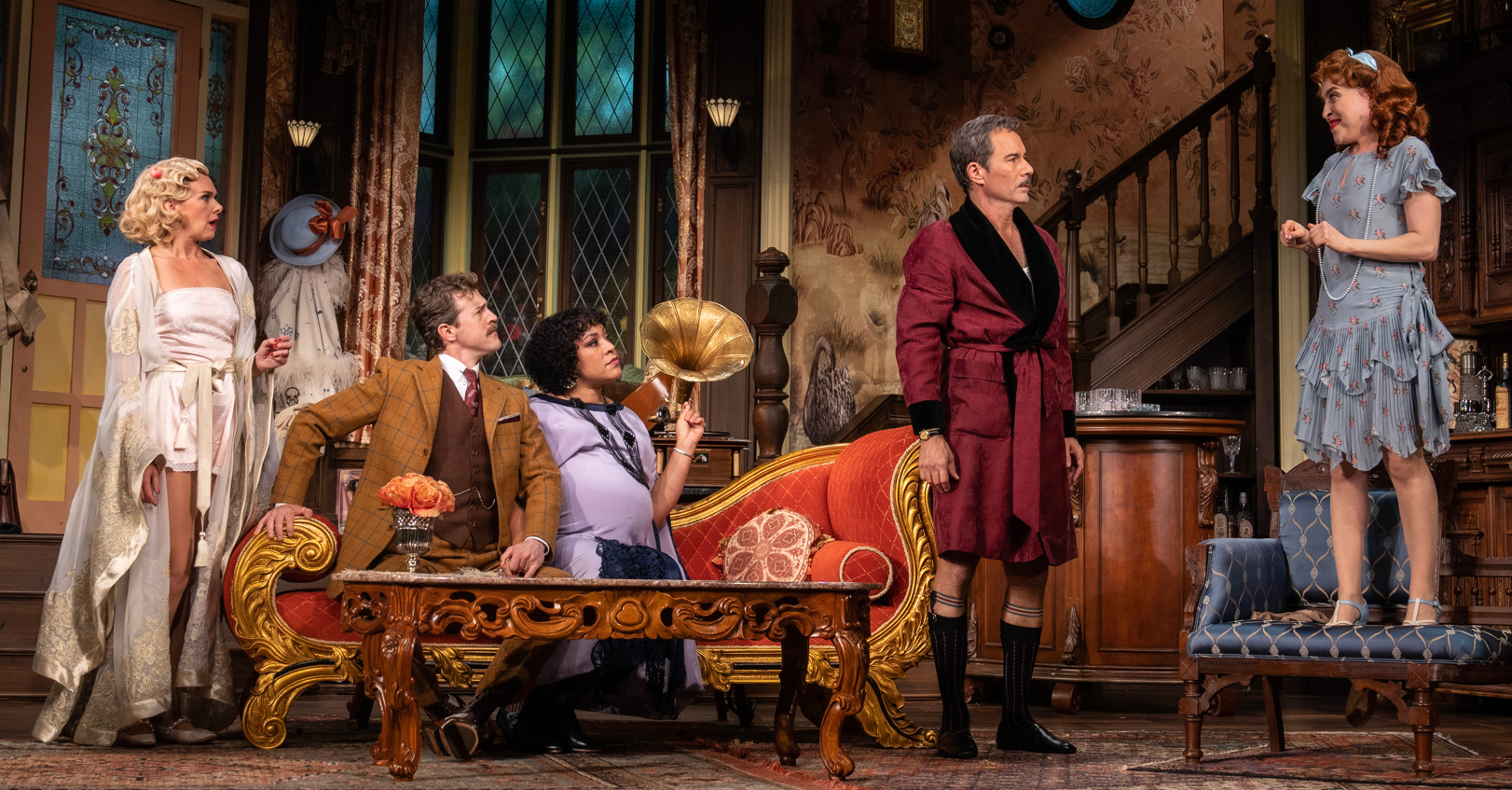THE COTTAGE
by Sandy Rustin
Directed by Jason Alexander
Featuring Eric McCormick and Laura Bell Bundy
Hayes Theatre
Official Website
Reviewed by David Spencer
The Cottage, strictly as a script, by Sandy Rustin, is the proverbial hat upon a hat. Though a contemporary script, it’s a riff on British drawing room comedy and British sex farce, conflating the two toward something a little more like an American screwball comedy (think Kaufman and Hart with a dab of Murray Schisgal, if your frame of reference goes back that far, and it probably has to). A drawing room comedy is by definition a staid affair, which can only break free of its confines via sharp wit and sharp turns of revelation along a theme worth exploring (think The Importance of Being Earnest), and sex farce is, well, just that, notable for the fact that rarely does anyone actually get laid; the complications happen as they try to.
British drawing room comedy tends to explore aspects of society (think Shavian dialectic); British sex farce tends to simply rev up the shenanigans, with any “exploration” as a pretext, when it bothers with a pretext (think Boeing, Boeing [I know, French, but it’s male British writer Beverly Cross’ English adaptation that we’re familiar with], and just about anything by Ray Cooney, if your fame of reference includes lowbrow antics and should if it doesn’t). But both tend toward commentary of one type or another. And of course, British sex farces—for the theatre anyway—have tended to be written by men, and not written recently (or at least not produced, that I’m aware of), because the current Zeitgeist would rebel against any but the most savvy presentation of female objectification.
Thus, Ms. Rustin’s riff, as a modern American female comedy writer, seems to be a response to the conventions: She pokes fun at the staid nature of drawing room comedy by making her characters try to handle the plot’s increasing absurdities with ever more desperate calm, on a deceptively stuffy set full of hidden surprises; and what she gives them to handle are sexual escapades (various infidelities, unexpected and escalating);. And her approach to commenting on the tropes of sex farce is to make the females every bit as opportunistic and/or predatory as the males, and to gradually turn the most capricious of the females into the most intuitive (implying that the seemingly shallow sexpot had it in her all along).
I don’t want to get into the plot complications or describe the characters; you don’t really need to know about them to decide if you want to attend. The only thing you do need to know is that the proceedings are set in the drawing room of an elaborate, mansion-like two-storey cottage in the English countryside and that the year is 1923. In which nutty things ensue.
The hat on the hat, of course is that The Cottage is a comedic comment on both the cited classic forms of comedic commentary. I don’t mean to suggest that Ms Rustin doesn’t know what she’s doing in this wise, but she is walking a tightrope. I’m not, however, entirely sure her director knows what she’s doing. Or, more accurately perhaps, knows how to best work with what she’s put in his hands.
For Jason Alexander has added yet another hat to the play’s noggin by having his gifted cast gear their performances toward style commentary. He encourages them to exploit every pose within every trope, every illustrative gesture within every image, every spell-out within every joke; ceaseless bits and business. For which there are two saving graces: (1) that Mr. Alexander—an actor whose own comic performances, even in extremis, are informed by a sense of verisimilitude—has at least (and I assume very consciously) gathered an ensemble with a likewise equally sharp sense of playing for real stakes, and therefore, (2) they’re equipped to deal with the excess. Lesser players would be mugging and gleeping and going boin-oing-oing-oing and face-palming and whatever else lesser players do when they’re directed to BE FUNNY, DAMMIT! But these folks, in keeping with Mr. Alexander’s desire to go big, have figured out how to push the envelope without breaking it. That’s a tightrope walk too—and the daredevils are Eric McCormack, Laura Bell Bundy, Lili Cooper, Nehal Joshi, Alex Moffat and Dana Steingold.
I have to assume that the author likes what her director is doing; she’s the first face in the TV commercial for the play…and the play seems to be getting its laughs. (Though the night I attended, sitting in maybe the fifth or sixth row, it seemed that the laughs were happening behind me, not around me; make of that what you will.)
But if The Cottage had been directed with more of a gossamer touch—the easy lob, rather than the fast-ball—what we used to get from the likes of Mike Nichols, Gene Saks; what we get these days from the likes of David Cromer, Jack O’Brien, still from the venerable Alan Ayckbourn…even from the Goes Wrong crew, who, check ‘em out again on YouTube, always maintain that keen balance between believably fallible humanity and escalating physical comedy. If The Cottage had been directed somehow to fit within that…
…well, it would have been even funnier.
But that takes a deeper level of trust; trust in the material to speak for itself; trust in the actors speaking for the material aloud; and trust in the audience to know it’s funny without your having to make sure they notice…
